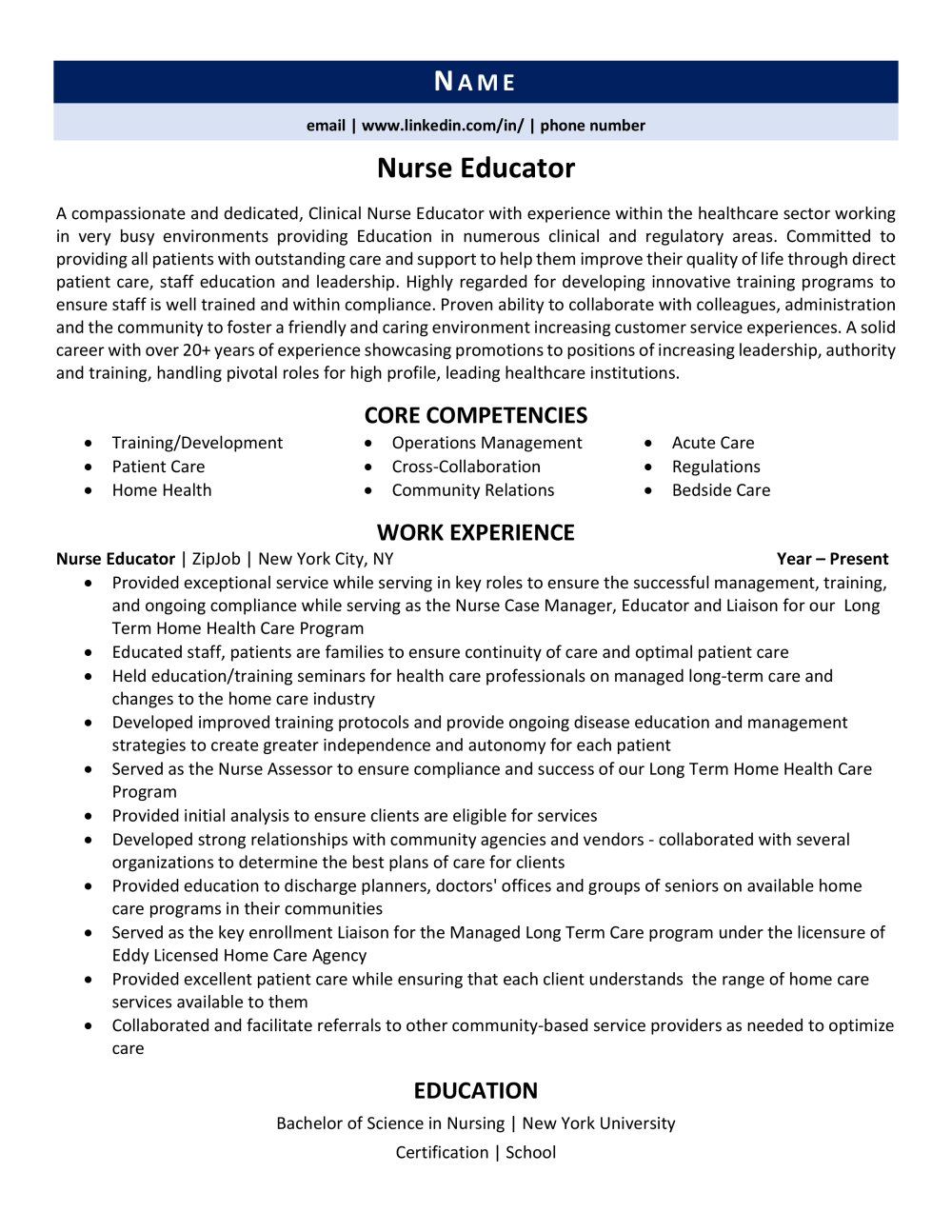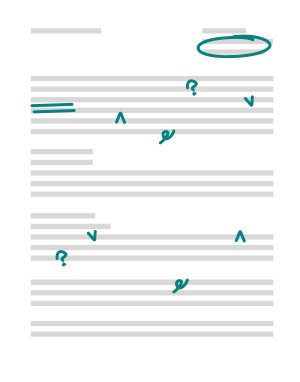Nurse Educator Sample
Download and customize our resume template to land more interviews. Review our writing tips to learn everything you need to know for putting together the perfect resume.
A Nurse Educator trains and develops nursing staff to strengthen their skillsets. Below is a general job description:
A nurse educator oversees the continuing education and evaluation of the nursing staff and caregivers. They normally work with hospital administrators to develop continuing education programs and evaluations for the staff at their institution, as well as help set policies and create systems related to patient care. The nurse educator analyzes a wide spectrum of healthcare needs to provide the best educational resources for staff of a hospital or clinic. They must be able to facilitate training, evaluations, and any necessary employee remediation. This may involve development of manuals, training guides, and a variety of procedures and systems. The nurse educator typically delivers presentations to larger groups both in person and via teleconference. Payscale
If this is the kind of job you want or you have, you're in the right place! We have a resume example for you and three tips from our professional resume writers below.
Expert Tip
You should never use a creative resume
Many job seekers think that an eye-catching resume template will help them stand out to hiring managers and increase their chances of landing an interview. This is a myth put out by resume builders that value design over content.
The truth is that most hiring managers prefer a traditional resume format.
Creative resume templates, like the one pictured here, can actually hurt your chances of landing an interview. Instead, you should use a basic resume format that quickly communicates your basic information and qualifications–like the one included below.
Nurse Educator resume (text format)
How confident are you feeling about your resume? If you need more help, you can always refer to the following resume sample for a position.
Name
Title
City, State or Country if international
Phone | Email
LinkedIn URL
NURSE EDUCATOR PROFESSIONAL
A compassionate and dedicated, Clinical Nurse Educator with experience within the healthcare sector working in very busy environments providing Education in numerous clinical and regulatory areas. Committed to providing all patients with outstanding care and support to help them improve their quality of life through direct patient care, staff education and leadership. Highly regarded for developing innovative training programs to ensure staff is well trained and within compliance. Proven ability to collaborate with colleagues, administration and the community to foster a friendly and caring environment increasing customer service experiences. A solid career with over 20+ years of experience showcasing promotions to positions of increasing leadership, authority and training, handling pivotal roles for high profile, leading healthcare institutions.
CORE COMPETENCIES
Training/Development
Patient Care
Home Health
Operations Management
Cross-Collaboration
Community Relations
Acute Care
Regulations
Bedside Care
PROFESSIONAL EXPERIENCE
Nurse Educator
ZipJob, New York NY | Year to Year
Responsibilities
Provided exceptional service while serving in key roles to ensure the successful management, training, and ongoing compliance while serving as the Nurse Case Manager, Educator and Liaison for our Long Term Home Health Care Program
Educated staff, patients are families to ensure continuity of care and optimal patient care
Held education/training seminars for health care professionals on managed long-term care and changes to the home care industry
Developed improved training protocols and provide ongoing disease education and management strategies to create greater independence and autonomy for each patient
Served as the Nurse Assessor to ensure compliance and success of our Long Term Home Health Care Program
Provided initial analysis to ensure clients are eligible for services
Developed strong relationships with community agencies and vendors - collaborated with several organizations to determine the best plans of care for clients
Provided education to discharge planners, doctors' offices and groups of seniors on available home care programs in their communities
Served as the key enrollment Liaison for the Managed Long Term Care program under the licensure of Eddy Licensed Home Care Agency
Provided excellent patient care while ensuring that each client understands the range of home care services available to them
Collaborated and facilitate referrals to other community-based service providers as needed to optimize care
EDUCATION
Complete School Name, City, St/Country: List Graduation Years If Within the Last Ten Years
Complete Degree Name (Candidate) – Major (GPA: List if over 3.3)
Relevant Coursework: List coursework taken (even include those you are planning on taking)
Awards/Honors: List any awards, honors or big achievements
Clubs/Activities: List clubs and activities in which you participated
Relevant Projects: List 2-3 projects you have worked on
Everything you need to write your nurse educator resume
Now that you’ve seen an example of a job winning Nurse Educator resume, here are some tips to help you write your own. You should always begin with a summary section. Remember to use basic formatting with clear section headings and a traditional layout. Finally, be sure to include top skills throughout your resume. We’ve included several examples common for Nurse Educator below.
Let’s start with your resume summary section.
1. Summary
The resume summary replaces the out-of-date resume objective. A summary outlines the most impressive parts of your resume for easy recall by your potential employer, while also serving to fill in personal qualities that may not appear elsewhere on the page. Remember that summaries are short and consist of pithy sentence fragments! You can check out the Nurse Educator resume example for more information!
Expert Tip
Always start with your most recent positions at the top of your resume. This is called reverse-chronological format, and keeps your most relevant information easy for hiring managers to review.
2. Formatting
Our experts recommend you start your resume with a resume summary, like the one above. Other common sections are Work Experience, Education, and either Skills or Core Competencies. Here are some guides from our blog to help you write these sections:
Some resumes will include other sections, such as Volunteer Experience or Technical Skills. When it comes to what sections you need to include on your resume, you will know best!
Other sections for you to consider including are foreign language skills, awards and honors, certifications, and speaking engagements. These could all be relevant sections for your resume.
3. Appropriate skills
Your resume should include all your skills that are relevant to your target job. Skills include both hard skills and soft skills. Hard skills are the technical know-how you need to complete a job, such as data analysis or HTML. You can include hard skills in your core competencies section. Soft skills are harder to quantify, so they require more information to explain your aptitude. Some top soft skill examples include communication, problem solving, and emotional intelligence. Use several examples of how you use your key soft skills throughout your work history, profile summary, and resume title.
4. Experience section
Your Work Experience section should make up the bulk of your resume. This section should include your relevant job titles, companies that employed you, and the dates you were employed.
Your Work Experience section should make up the bulk of your resume. This section should include your relevant job titles, companies that employed you, and the dates you were employed. Most people will finish this section by listing daily duties in short bullet points. Don't be one of them! To make your resume stand out, you need to add your accomplishments and key skills to your resume's Work Experience section. Here are three tips from our experts:
Use the STAR method to describe a situation, task, action, and result. This is adapted from a behavioral interview technique, so interviewers will recognize the format. it's also a great chance for you to organize your key accomplishments.
Don't forget about LinkedIn! The majority of employers are going to look you up on LinkedIn, so it's smart to make sure your LInkedIn profile is up to date and include your URL in your resume's contact section.
Always include a cover letter. Not everyone will bother, so it helps you look like a serious job applicant. It's also your chance to introduce yourself: who you are, why you're applying for this job, and how you want to proceed.
Let’s wrap it up!
Standout resumes will include a resume summary, a traditional reverse-chronological layout, and the skills and experience relevant to your job target. This resume example shows how to include those elements on a page. It’s up to you to insert your personal compelling qualifications.
Keep your resume format easy to scan by both humans and computers; our resume template is designed by our experts to satisfy both audiences. And be sure to include your own skills, achievements, and experiences. Job-winning resumes are resumes that successfully market you, leading recruiters and hiring managers to want to learn more!
Finally, emphasize your interest with a customized cover letter. When writing, remember that the resume and cover letter should support each other. Check out our cover letter tips and examples for more advice.
Didn’t get the specific answers you were looking for on this page? Hire a professional resume writer to get the advice you need to land your next job.
Related posts:




